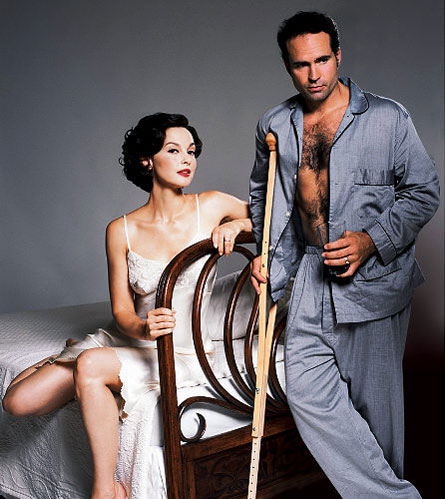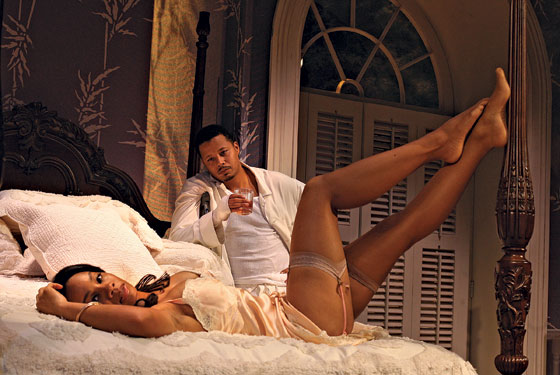 Earlier this month, I posted a review of the Richard Brooks’ film “The Happy Ending.†Much to my surprise and delight, I had a comment from Douglass K. Daniel, author of the new book “Tough as Nails: The Life and Films of Richard Brooks.â€This is Douglass’ third book, following a comprehensive look at the TV series “Lou Grant†and a biography of Harry Reasoner.After a few e-mail exchanges, Douglass agreed to answer a few questions for me regarding Richard Brooks (above). Below is our conversation.CFB: What first interested you in Richard Brooks?DD: When I hit on the idea of a Richard Brooks biography, I revisited his filmography. I knew about “In Cold Blood,†of course, and “Elmer Gantry.â€! And I remember seeing “Bite the Bullet†in the theater. What surprised me were his connections to other movies I have liked: “Key Largo,†“Blackboard Jungle,†“Deadline-U.S.A.,†“The Professionals,†and “Lord Jim.†I was also intrigued with the movies I’d never heard of, such as “Crisis†and “The Last Hunt.â€Writing a book means living with the subject of it for two or three years. Based on those movies and the little bit I’d read about Richard Brooks as a person, I thought he would make a compelling subject to explore and to tell about to others. And I was right, I think.From your point of view, what about Brooks and his work do you think attracts people all these years later?CFB: The strong material. He didn’t shy away from hard-hitting themes, yet he found a way to present them intelligently and cinematically. The fact that he was able to successfully translate material from another medium to film demonstrates his ability to underst! and the main themes and character traits of material and how t! o preser ve them yet tell a good story at the same time on film.How would you rank Brooks among Hollywood's great writers/directors?DD: To my mind, Richard Brooks is indeed in the top tier of the writer-directors. I think his best work rivals that of contemporaries like Billy Wilder, Joseph L. Mankiewicz and John Huston, filmmakers who were writers first and directors second. Brooks worked alone and thus was not as prolific as many directors and some writer-directors, yet he built a significant body of work while writing scripts and directing movies about subjects he cared about and ideas he wanted to share with audiences.He had some real misfires, to be sure. “Wrong Is Right†is off-key, and “Fever Pitch†is almost unwatchable. He is an imperfect artist. But aren’t they all? There are several movies by those named above that are just lousy. Some have a better “batting average†than others. I think that Brooks operated at a pretty high level.Tell me, how do you assess h! is body of work in relation to that of his peers?CFB: I agree with you. I’ve always admired writer-directors, because in my mind a good movie starts with strong material. The best writers-directors understand this and realized that their directing skills are to enhance the story, not take precedence over it. Brooks definitely falls into this category.What's one thing people will be surprised to know about Brooks?DD: I think people may be surprised at his passion for his work. I know I was.Not all filmmakers are that driven. I’ve never had the impression that John Huston was all that devoted to filmmaking; he enjoyed life in all its glory and, to me, saw filmmaking as a means to an end as well as a way to express himself. (And he made some great movies.) Brooks shared that sense of obsession that appears to have driven Kubrick, if to a lower degree.Brooks loved the movies, loved working, and believed film was just the right medium for expressing himself. And he had tried! other media â€" short stories and novels, for example, even a! few pla ys. He put writing and directing above everything else in his life. Work is what he enjoyed, what drove him to begin the day. And, in the end, when his creative life was over, because of age an infirmity, I think he may have found it hard to go on, perhaps even pointless.I’m curious to know your opinion â€" do you think biography is an effective way to look at a director’s work, or do you prefer the “films of†approach that bypasses narrative to focus on the movies rather than the moviemaker?CFB: Honestly, I like the mixture of both. It’s important to learn where a person came from, because that influences his or her work. The “backstory,†so to speak, is important to me. But then I want to know about the films themselves â€" why that material was selected, what challenges were being faced, etc. Often you can see what formed the filmmaker show up in his work and decisions, which enriches the in-depth narratives of the movies themselves.
Earlier this month, I posted a review of the Richard Brooks’ film “The Happy Ending.†Much to my surprise and delight, I had a comment from Douglass K. Daniel, author of the new book “Tough as Nails: The Life and Films of Richard Brooks.â€This is Douglass’ third book, following a comprehensive look at the TV series “Lou Grant†and a biography of Harry Reasoner.After a few e-mail exchanges, Douglass agreed to answer a few questions for me regarding Richard Brooks (above). Below is our conversation.CFB: What first interested you in Richard Brooks?DD: When I hit on the idea of a Richard Brooks biography, I revisited his filmography. I knew about “In Cold Blood,†of course, and “Elmer Gantry.â€! And I remember seeing “Bite the Bullet†in the theater. What surprised me were his connections to other movies I have liked: “Key Largo,†“Blackboard Jungle,†“Deadline-U.S.A.,†“The Professionals,†and “Lord Jim.†I was also intrigued with the movies I’d never heard of, such as “Crisis†and “The Last Hunt.â€Writing a book means living with the subject of it for two or three years. Based on those movies and the little bit I’d read about Richard Brooks as a person, I thought he would make a compelling subject to explore and to tell about to others. And I was right, I think.From your point of view, what about Brooks and his work do you think attracts people all these years later?CFB: The strong material. He didn’t shy away from hard-hitting themes, yet he found a way to present them intelligently and cinematically. The fact that he was able to successfully translate material from another medium to film demonstrates his ability to underst! and the main themes and character traits of material and how t! o preser ve them yet tell a good story at the same time on film.How would you rank Brooks among Hollywood's great writers/directors?DD: To my mind, Richard Brooks is indeed in the top tier of the writer-directors. I think his best work rivals that of contemporaries like Billy Wilder, Joseph L. Mankiewicz and John Huston, filmmakers who were writers first and directors second. Brooks worked alone and thus was not as prolific as many directors and some writer-directors, yet he built a significant body of work while writing scripts and directing movies about subjects he cared about and ideas he wanted to share with audiences.He had some real misfires, to be sure. “Wrong Is Right†is off-key, and “Fever Pitch†is almost unwatchable. He is an imperfect artist. But aren’t they all? There are several movies by those named above that are just lousy. Some have a better “batting average†than others. I think that Brooks operated at a pretty high level.Tell me, how do you assess h! is body of work in relation to that of his peers?CFB: I agree with you. I’ve always admired writer-directors, because in my mind a good movie starts with strong material. The best writers-directors understand this and realized that their directing skills are to enhance the story, not take precedence over it. Brooks definitely falls into this category.What's one thing people will be surprised to know about Brooks?DD: I think people may be surprised at his passion for his work. I know I was.Not all filmmakers are that driven. I’ve never had the impression that John Huston was all that devoted to filmmaking; he enjoyed life in all its glory and, to me, saw filmmaking as a means to an end as well as a way to express himself. (And he made some great movies.) Brooks shared that sense of obsession that appears to have driven Kubrick, if to a lower degree.Brooks loved the movies, loved working, and believed film was just the right medium for expressing himself. And he had tried! other media â€" short stories and novels, for example, even a! few pla ys. He put writing and directing above everything else in his life. Work is what he enjoyed, what drove him to begin the day. And, in the end, when his creative life was over, because of age an infirmity, I think he may have found it hard to go on, perhaps even pointless.I’m curious to know your opinion â€" do you think biography is an effective way to look at a director’s work, or do you prefer the “films of†approach that bypasses narrative to focus on the movies rather than the moviemaker?CFB: Honestly, I like the mixture of both. It’s important to learn where a person came from, because that influences his or her work. The “backstory,†so to speak, is important to me. But then I want to know about the films themselves â€" why that material was selected, what challenges were being faced, etc. Often you can see what formed the filmmaker show up in his work and decisions, which enriches the in-depth narratives of the movies themselves. Which of Brooks' films do you like the most and why?DD: I think his three best movies â€" those that offer compelling narratives, good dialogue, strong performances, and an interesting visual style â€" are “In Cold Blood,†“Elmer Gantry†and “The Professionals.†To me, his efforts in all those areas â€" editing, too â€" really clicked. (And that’s also because he had fine collaborators.) These movies form a high point in his career, kind of the top of the bell curve.Three others that are strong entries in the Brooks filmography are “Blackboard Jungle,†“Cat on a Hot Tin Roof†and “Sweet Bird of Youth.â€I don’t know if you’ve seen all of his movies, but I’d be interested to know what you think is a Br! ooks film that could have been great but fell short. Not woefu! lly shor t, but just didn’t seem to work as well as it should have.CFB: Honestly, it’s the movie that first brought you to my blog â€" “The Happy Ending.†I didn’t think it worked, but I saw numerous great moments, and I think he hit upon a general idea of this disillusioned housewife with some incredible insight at a time leading up to the women’s movement, plus he was trying to help his wife, Jean Simmons. But he couldn’t convey the problem or the symptoms properly. The movie stuck with me -- not for what it did but what it could have done (although Simmons was heartbreakingly terrific). DD: Here’s my “if only†movie: “Lord Jim.†It has so much going for it, not least of all Peter O’Toole and a grand cast as well as Freddie Young’s beautiful cinematography. It’s Brooks’s shot at delivering a David Lean film. But there is something that doesn’t quite connect, that makes this a wannabe epic and not a fully realized one. I enjoy watching it, but I alw! ays feel a little empty at the end.CFB: If you could meet Brooks, what would you ask him about first?DD: The biographer in me would want to ask him about his parents; I suspect their influence is something I can’t really appreciate without his help. I’d also ask about his wives; he was married at least four times, but I know nothing about Wife No. 1, and little about Wife No. 3.But, to the point of film rather than personal history, I think I’d ask Brooks whether, looking back, he wished he’d spent less time developing scripts and more time directing good scripts by other writers. He could have done at least a half-dozen more films than he did after “In Cold Blood†had he not insisted on writing everything himself. I’d say the same thing about Kubrick and the way he worked so methodically â€" don’t take 10 years to do a movie, Stanley, we want to see your genius more often.I know, I know -- that’s what makes their movies their movies. But, still … I’m ! a selfish movie-lover in this respect: I want more â€" like ga! ngster J ohnny Rocco says in “Key Largoâ€: “That's it! More. That's right, I want more!â€And, like Johnny Rocco, I guess I’ll never get enough.=======================================I’d like to thank Douglass for initially stopping by my blog and then in joining me for this conversation. Brooks has been on my mind this week in regards to the passing of Elizabeth Taylor, who was superb in the equally superb “Cat on a Hot Tin Roof.†Feel free to check out “Tough as Nails†on Amazon. If any of you have a question for Douglass, feel free to leave it in the comments. I’m sure he’d be happy to respond!
Which of Brooks' films do you like the most and why?DD: I think his three best movies â€" those that offer compelling narratives, good dialogue, strong performances, and an interesting visual style â€" are “In Cold Blood,†“Elmer Gantry†and “The Professionals.†To me, his efforts in all those areas â€" editing, too â€" really clicked. (And that’s also because he had fine collaborators.) These movies form a high point in his career, kind of the top of the bell curve.Three others that are strong entries in the Brooks filmography are “Blackboard Jungle,†“Cat on a Hot Tin Roof†and “Sweet Bird of Youth.â€I don’t know if you’ve seen all of his movies, but I’d be interested to know what you think is a Br! ooks film that could have been great but fell short. Not woefu! lly shor t, but just didn’t seem to work as well as it should have.CFB: Honestly, it’s the movie that first brought you to my blog â€" “The Happy Ending.†I didn’t think it worked, but I saw numerous great moments, and I think he hit upon a general idea of this disillusioned housewife with some incredible insight at a time leading up to the women’s movement, plus he was trying to help his wife, Jean Simmons. But he couldn’t convey the problem or the symptoms properly. The movie stuck with me -- not for what it did but what it could have done (although Simmons was heartbreakingly terrific). DD: Here’s my “if only†movie: “Lord Jim.†It has so much going for it, not least of all Peter O’Toole and a grand cast as well as Freddie Young’s beautiful cinematography. It’s Brooks’s shot at delivering a David Lean film. But there is something that doesn’t quite connect, that makes this a wannabe epic and not a fully realized one. I enjoy watching it, but I alw! ays feel a little empty at the end.CFB: If you could meet Brooks, what would you ask him about first?DD: The biographer in me would want to ask him about his parents; I suspect their influence is something I can’t really appreciate without his help. I’d also ask about his wives; he was married at least four times, but I know nothing about Wife No. 1, and little about Wife No. 3.But, to the point of film rather than personal history, I think I’d ask Brooks whether, looking back, he wished he’d spent less time developing scripts and more time directing good scripts by other writers. He could have done at least a half-dozen more films than he did after “In Cold Blood†had he not insisted on writing everything himself. I’d say the same thing about Kubrick and the way he worked so methodically â€" don’t take 10 years to do a movie, Stanley, we want to see your genius more often.I know, I know -- that’s what makes their movies their movies. But, still … I’m ! a selfish movie-lover in this respect: I want more â€" like ga! ngster J ohnny Rocco says in “Key Largoâ€: “That's it! More. That's right, I want more!â€And, like Johnny Rocco, I guess I’ll never get enough.=======================================I’d like to thank Douglass for initially stopping by my blog and then in joining me for this conversation. Brooks has been on my mind this week in regards to the passing of Elizabeth Taylor, who was superb in the equally superb “Cat on a Hot Tin Roof.†Feel free to check out “Tough as Nails†on Amazon. If any of you have a question for Douglass, feel free to leave it in the comments. I’m sure he’d be happy to respond! Great classic films, best all time movies
 Movie legend Elizabeth Taylor has died at the age of 79. Arguably the biggest film icon, along with Marilyn Monroe, to come forth from the screen, Taylor was the much married, much publicized, much ridiculed and much loved star, known above all for her dark, sultry beauty.Literal volumes have been written about Elizabeth Taylor, as there was a lot in her long and varied life to record. Born in Hampstead, England on February 27, 1932, she came to the United States and began her career as a child star. Her soft voice, violet eyes and dark good looks, set her apart from others and with National Velvet, made in 1944, she made a name for herself and a wad of dough for her studio, MGM. ! Unlike other child actors, she made the transition to adult roles almost seamlessly, due to her mature beauty at an early age (the girl looked like a goddess at 16 in A Date with Judy).First married at 18 to hotel heir Nicky Hilton, she later married seven more times, twice to actor Richard Burton. Through them all, as well as her personal and public trials, tribulations and many health problems, the press followed her like a gossip hungry entourage. Heck, for an information hungry media, she was a veritable scandal buffet!
Movie legend Elizabeth Taylor has died at the age of 79. Arguably the biggest film icon, along with Marilyn Monroe, to come forth from the screen, Taylor was the much married, much publicized, much ridiculed and much loved star, known above all for her dark, sultry beauty.Literal volumes have been written about Elizabeth Taylor, as there was a lot in her long and varied life to record. Born in Hampstead, England on February 27, 1932, she came to the United States and began her career as a child star. Her soft voice, violet eyes and dark good looks, set her apart from others and with National Velvet, made in 1944, she made a name for herself and a wad of dough for her studio, MGM. ! Unlike other child actors, she made the transition to adult roles almost seamlessly, due to her mature beauty at an early age (the girl looked like a goddess at 16 in A Date with Judy).First married at 18 to hotel heir Nicky Hilton, she later married seven more times, twice to actor Richard Burton. Through them all, as well as her personal and public trials, tribulations and many health problems, the press followed her like a gossip hungry entourage. Heck, for an information hungry media, she was a veritable scandal buffet! Not only a pretty face and name in the news, Taylor was also an Academy award winning actress. Her first Oscar came to her in 1960 for Bu! tterfield 8 (some say as a consolation for nearly dyi! ng from pneumonia the previous year), her second for a much deserved performance with her then husband Burton in Who’s Afraid of Virginia Woolf in 1966. In 1999, La Liz was appointed Dame Commander of the Order of the British Empire. The title suited her.Besides the afore mentioned films, Taylor appeared in such classics as Little Women (1948), the original Father of the Bride (1950), Giant (1956), Cat on a Hot Tin Roof (1958) and the massive Cleopatra (1963) the mega-bomb in which she met and fell in lust/love with Burton and became the first actress to be paid $1 million for a single film. (The thing about Cleopatra is, despite its woeful reception by critics, it was the highest grossing picture of 1963, but due to its enormous production costs ~ it was set to cost $2 million, but ended up with a $44 million price tag ~ it lost millions). Love her or hate her, E! lizabeth Taylor was a true movie star.
Not only a pretty face and name in the news, Taylor was also an Academy award winning actress. Her first Oscar came to her in 1960 for Bu! tterfield 8 (some say as a consolation for nearly dyi! ng from pneumonia the previous year), her second for a much deserved performance with her then husband Burton in Who’s Afraid of Virginia Woolf in 1966. In 1999, La Liz was appointed Dame Commander of the Order of the British Empire. The title suited her.Besides the afore mentioned films, Taylor appeared in such classics as Little Women (1948), the original Father of the Bride (1950), Giant (1956), Cat on a Hot Tin Roof (1958) and the massive Cleopatra (1963) the mega-bomb in which she met and fell in lust/love with Burton and became the first actress to be paid $1 million for a single film. (The thing about Cleopatra is, despite its woeful reception by critics, it was the highest grossing picture of 1963, but due to its enormous production costs ~ it was set to cost $2 million, but ended up with a $44 million price tag ~ it lost millions). Love her or hate her, E! lizabeth Taylor was a true movie star. 
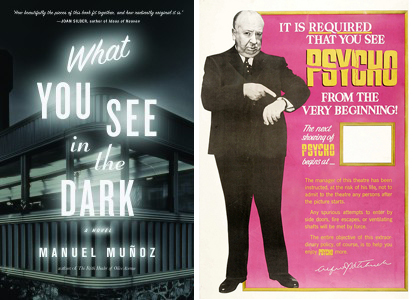 Consider this amazing "double feature"
Consider this amazing "double feature" Manuel Muñoz by © Stuart Bernstein
Manuel Muñoz by © Stuart Bernstein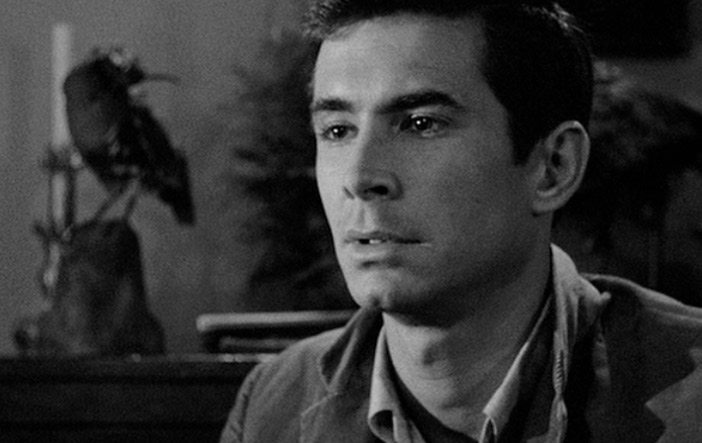
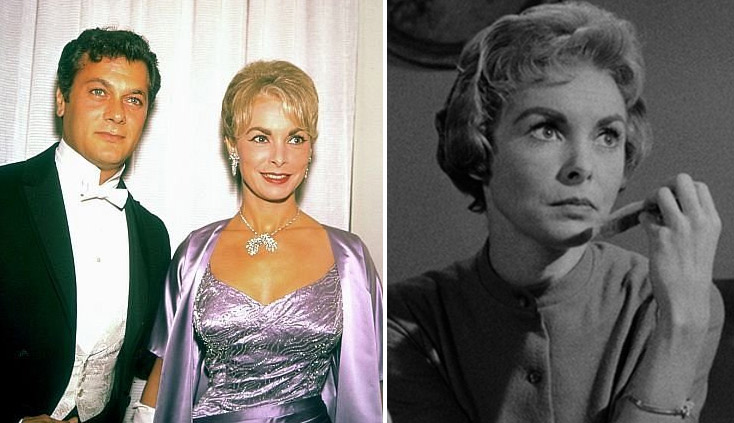 Tony Curtis and Janet Leigh at the Oscars for her "Psycho" nomination
Tony Curtis and Janet Leigh at the Oscars for her "Psycho" nomination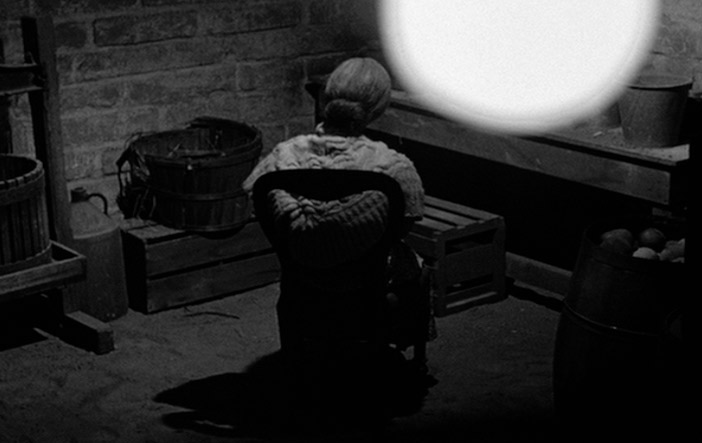

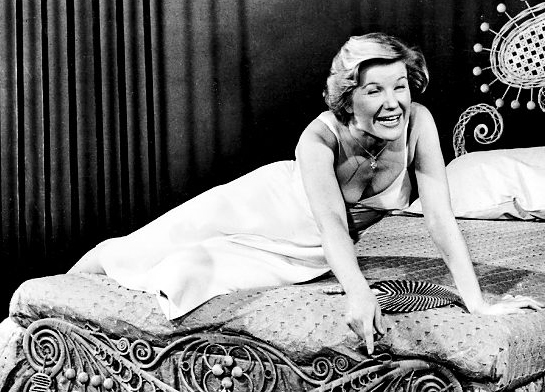
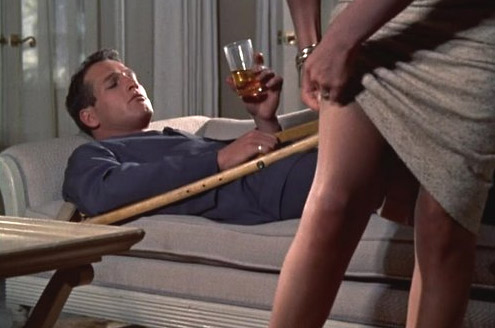
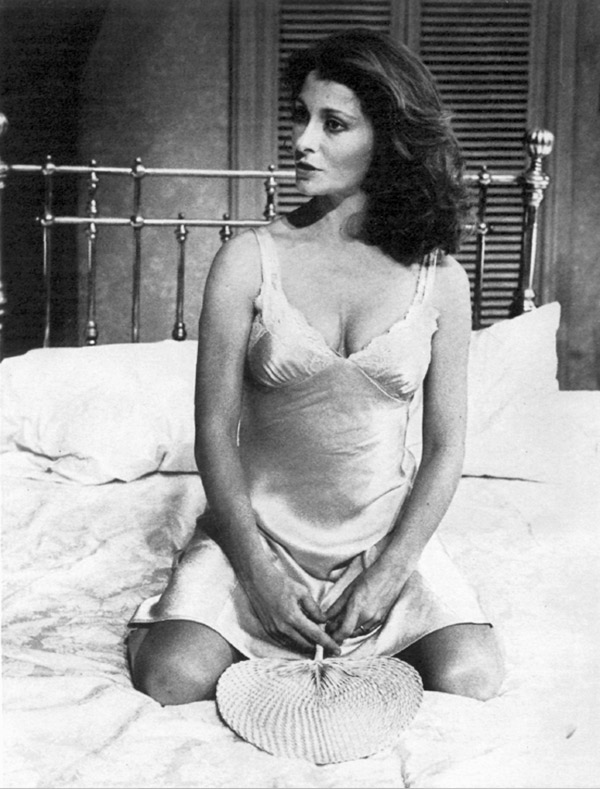
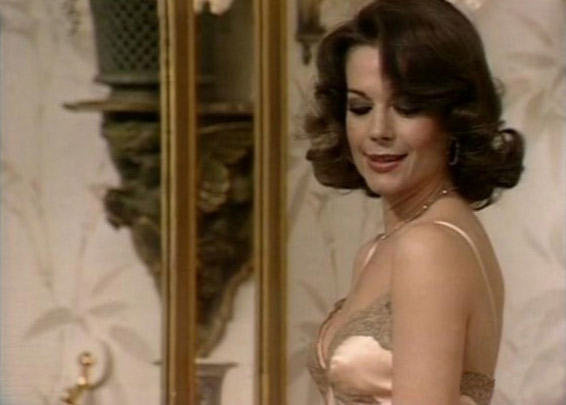
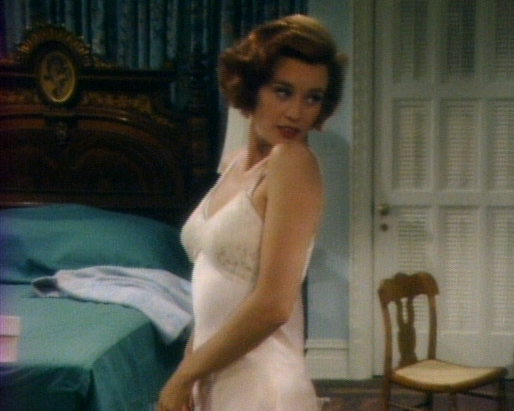
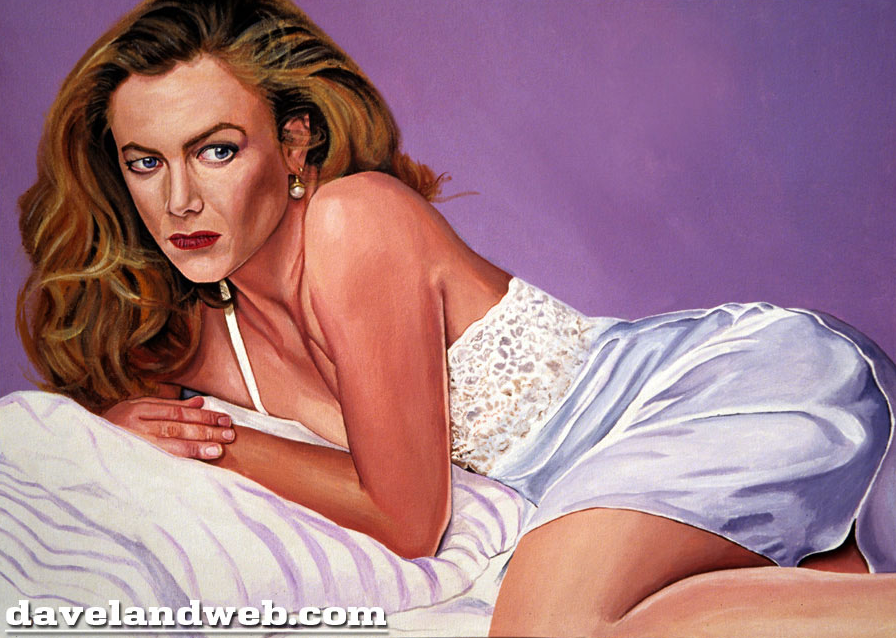 Painting by Dave DeCaro
Painting by Dave DeCaro